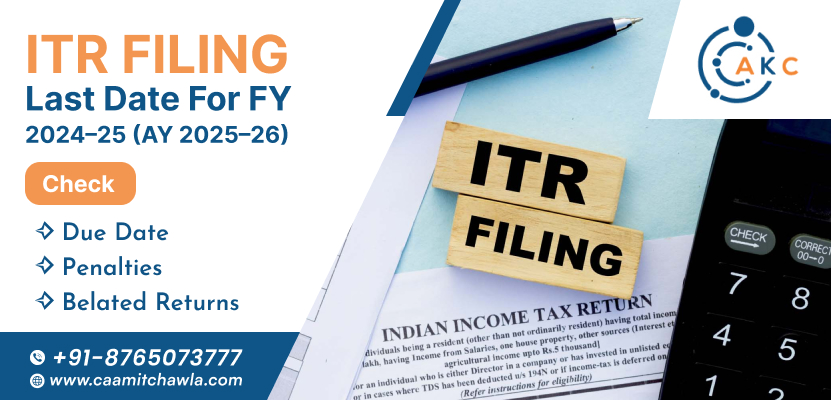
Income Tax ITR Filing Due Date
- admin
- 16-Sep-2025


Income Tax ITR Filing Due Date
The deadline for filing an ITR for the 2024–25 fiscal year (AY 2025–26) is 16 September, 2025. If you don't file by this date, you could be charged interest under Section 234A and a late filing fee of up to ₹5,000 under Section 234F. You can still file a late return on or before December 31, 2025, even if you miss the deadline.
Every year, millions of taxpayers in India wait until the last moment to file their Income Tax Return (ITR). While the process has become much smoother with online filing, the ITR filing due date remains one of the most searched queries during tax season. Missing the deadline can lead to penalties, interest charges, and even loss of certain tax benefits.
For Financial Year (FY) 2024-25 corresponding to Assessment Year (AY) 2025-26, the Income Tax Department has prescribed different ITR due dates depending on the category of taxpayer. In this article, I’ll walk you through all important deadlines, penalties for late filing, options if you miss the due date, and practical tips to avoid last-minute stress.
The due date to file ITR is not the same for everyone. It depends on whether you are an individual, a company, subject to audit, or covered under transfer pricing rules.
|
Category of Taxpayer |
ITR Filing Due Date (FY 2024-25 / AY 2025-26) |
|
Individuals (Non-Audit Cases), HUFs, Firms (non-audit) |
16 September 2025 (extended from 15 September, 2025) |
|
Businesses requiring audit (u/s 44AB) |
31 October 2025 |
|
Taxpayers covered under Transfer Pricing Audit (u/s 92E) |
30 November 2025 |
|
Belated/ Revised Return filing |
31 December 2025 |
|
Updated Return (ITR-U) |
Within 24 months from the end of AY (till 31 March 2028) |
For AY 2025-26, the government extended the individual taxpayer deadline from 15 Sep 2025 to 16 September 2025.
This was mainly due to:
Filing your ITR after the deadline can be costly. Let’s look at the key implications:
If you miss the deadline, all is not lost. The law provides alternatives:
|
Return Type |
Last Date for FY 2024-25 (AY 2025-26) |
Key Points |
|
Belated Return (u/s 139(4)) |
31 December 2025 |
Filed after the original due date but before the end. Late fee applicable. |
|
Revised Return (u/s 139(5)) |
31 December 2025 |
Can be filed to correct mistakes in the original/belated return. |
|
Updated Return (ITR-U) (u/s 139(8A)) |
31 March 2028 |
Can be filed within 24 months of AY. Higher additional tax liability. |
Step 1: Collect Documents: Form 16, AIS/TIS, Form 26AS, bank statements, investment proofs, rent receipts, etc.
Step 2: Log in to the e-filing portal: https://www.incometax.gov.in/iec/foportal/
Step 3: Choose ITR Form: (ITR-1, ITR-2, ITR-3, etc.) depending on your income sources.
Step 4: Fill Details Carefully: Salary, business income, capital gains, deductions.
Step 5: Pay Self-Assessment Tax if due: Ensure no outstanding tax remains.
Step 6: Submit Return Online: Verify using Aadhaar OTP, net banking, or DSC.
Step 7: Save Acknowledgment (ITR-V): Important for records.
|
Checklist Item |
Why It Matters |
|
Verify Form 26AS & AIS |
To avoid a mismatch with the TDS/Income data |
|
Claim Deductions (80C, 80D, 80G, etc.) |
To reduce tax liability |
|
Report All Bank Accounts |
Mandatory disclosure |
|
Disclose Foreign Assets (if applicable) |
To avoid penalties under Black Money Act |
|
E-Verify ITR |
Return not valid unless verified |
Even if your income is below the taxable limit, you should consider filing ITR if:
As an Expert CA for ITR Filing in Lucknow, we at CA Amit K Chawla & Co. mentioned below some Important Tips for ITR Filing:
Filing your Income Tax Return (ITR) is not just a compliance requirement but also a financial discipline. For FY 2024-25 (AY 2025-26), the extended last date for individuals is 16 September 2025. Missing it can cost you money and opportunities.
As a tax consultant, my advice is simple: file early, file accurately, and keep records safe. You Can Contact CA Amit Chawla at +91-8765073777 for Expert ITR Filing Services. The Income Tax Department’s systems are becoming increasingly data-driven, so timely compliance not only saves penalties but also builds a strong financial profile.
A: 16 September 2025 (extended from 31 July 2025).
A: Yes, you can file a belated return till 31 December 2025 with a late fee.
A: You may face penalties, prosecution in extreme cases, and lose carry-forward benefits.
A: It allows taxpayers to file/update returns within 24 months from the end of the AY with additional tax liability.
A: Yes, due dates are the same, but they may get relief from advance tax in some cases.
A: Yes, salaried individuals can file ITR without Form 16 by using salary slips, Form 26AS, AIS, and bank statements to calculate income and taxes paid.
A: An unverified ITR is considered invalid. You must e-verify within 30 days of filing; otherwise, the return will be treated as not filed.
A: Yes, many banks and embassies require timely filed ITR acknowledgments for loan approval or visa processing. A delayed ITR may raise questions.
A: Not mandatory, but recommended if you had TDS deducted, want a refund, or need ITR for financial proof.
A: Yes, you can file revised returns multiple times until 31 December 2025, provided they are within the deadline and each revision corrects genuine errors.